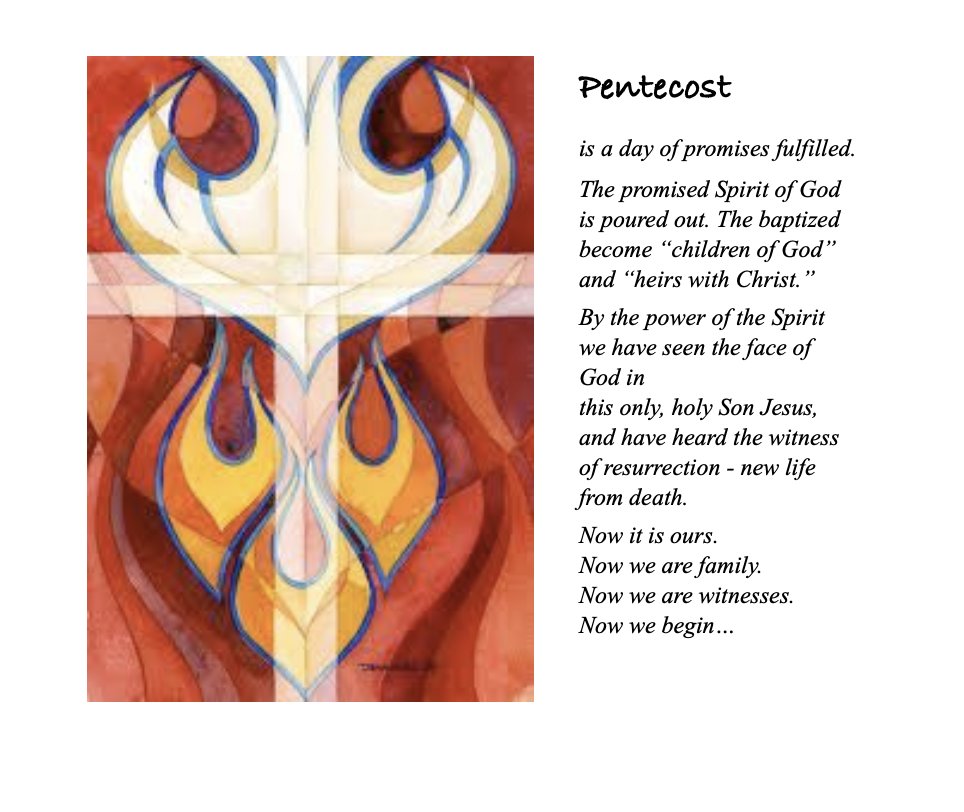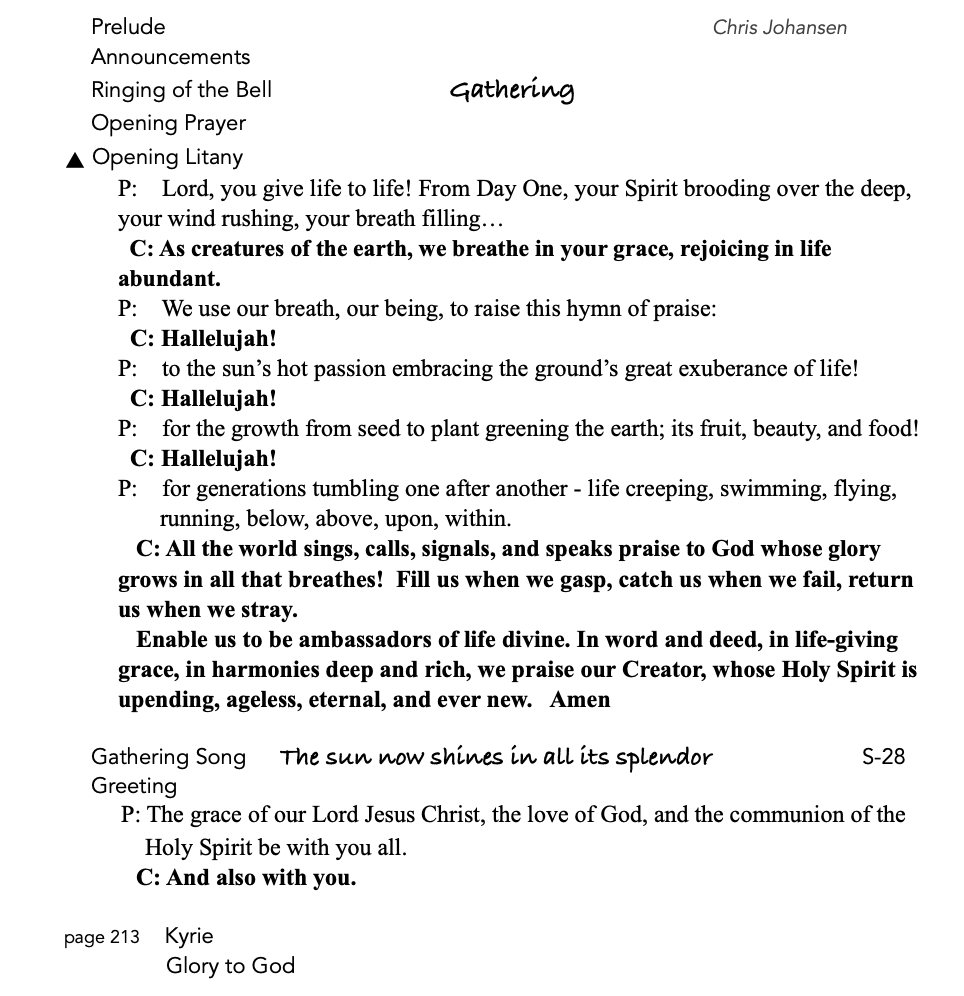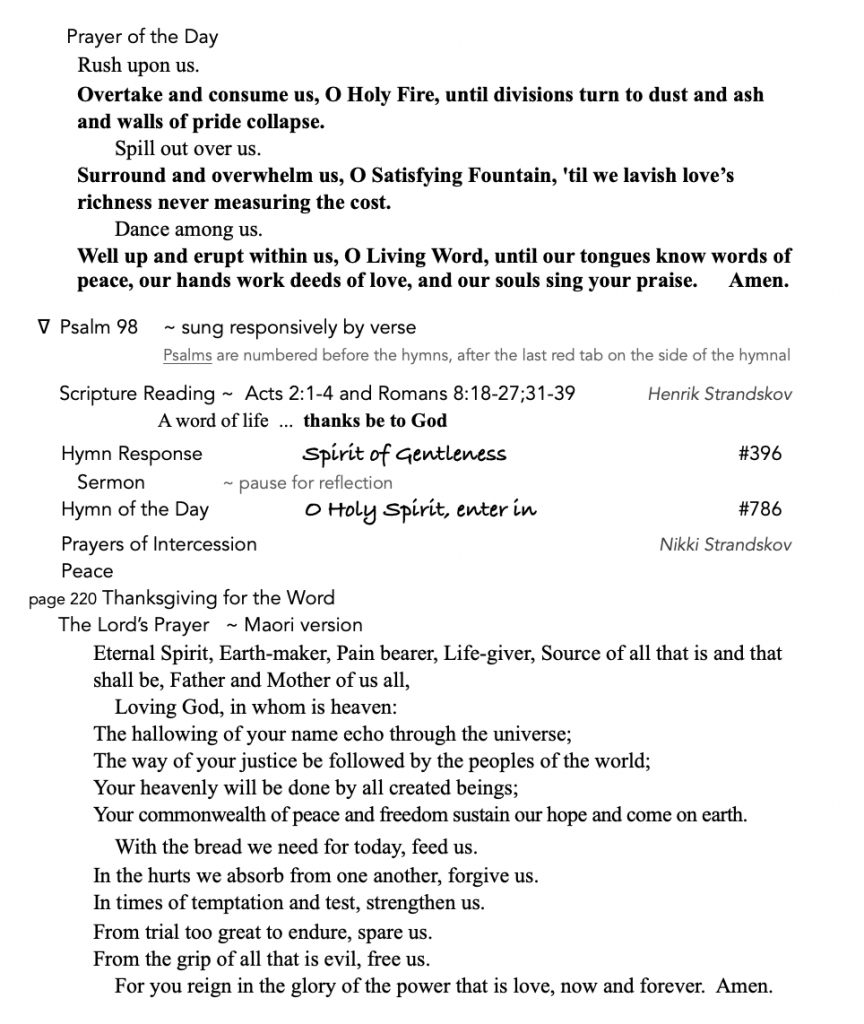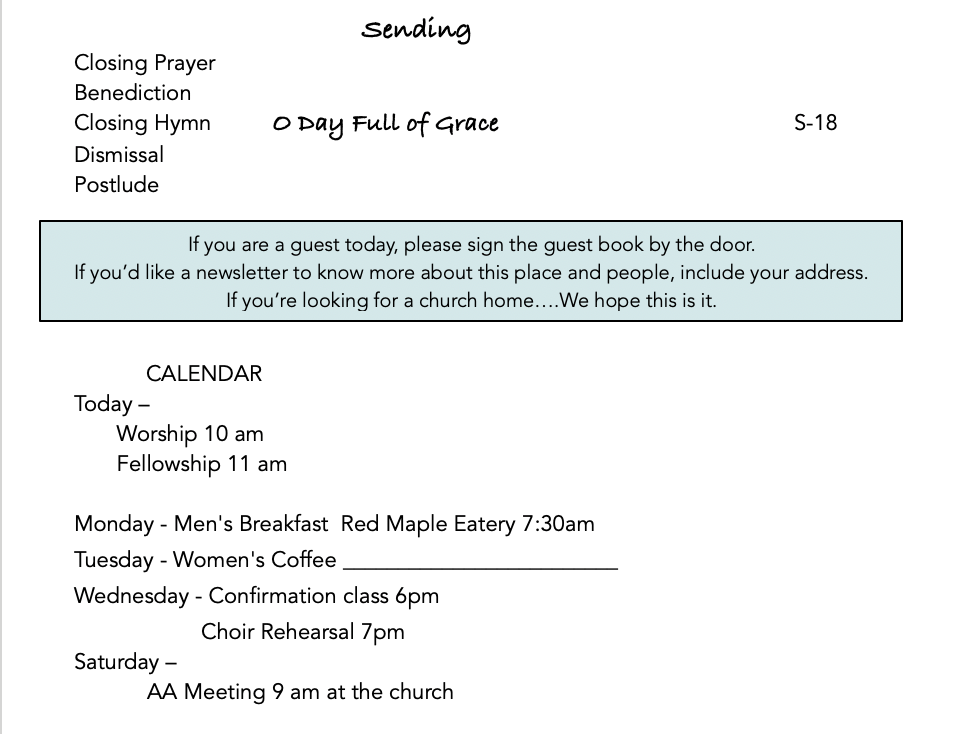Audio Recording




From the book of Acts, the second chapter:
When the day of Pentecost had come, they were all together in one place. 2And suddenly from heaven there came a sound like the rush of a violent wind, and it filled the entire house where they were sitting. 3Divided tongues, as of fire, appeared among them, and a tongue rested on each of them. 4All of them were filled with the Holy Spirit and began to speak in other languages, as the Spirit gave them ability.
And from Paul’s letter to the Roman church, the 8th chapter:
18I consider that the sufferings of this present time are not worth comparing with the glory about to be revealed to us. 19For the creation waits with eager longing for the revealing of the children of God; 20for the creation was subjected to futility, not of its own will but by the will of the one who subjected it, in hope 21that the creation itself will be set free from its bondage to decay and will obtain the freedom of the glory of the children of God. 22We know that the whole creation has been groaning in labor pains until now; 23and not only the creation, but we ourselves, who have the first fruits of the Spirit, groan inwardly while we wait for adoption, the redemption of our bodies. 24For in hope we were saved. Now hope that is seen is not hope. For who hopes for what is seen? 25But if we hope for what we do not see, we wait for it with patience.
26Likewise the Spirit helps us in our weakness; for we do not know how to pray as we ought, but that very Spirit intercedes with sighs too deep for words. 27And God, who searches the heart, knows what is the mind of the Spirit, because the Spirit intercedes for the saints according to the will of God.
31What then are we to say about these things? If God is for us, who is against us? 32He who did not withhold his own Son, but gave him up for all of us, will he not with him also give us everything else? 33Who will bring any charge against God’s elect? It is God who justifies. 34Who is to condemn? It is Christ Jesus, who died, yes, who was raised, who is at the right hand of God, who indeed intercedes for us. 35Who will separate us from the love of Christ? Will hardship, or distress, or persecution, or famine, or nakedness, or peril, or sword?
37No, in all these things we are more than conquerors through him who loved us. 38For I am convinced that neither death, nor life, nor angels, nor rulers, nor things present, nor things to come, nor powers, 39nor height, nor depth, nor anything else in all creation, will be able to separate us from the love of God in Christ Jesus our Lord.
The word of God, the word of life……thanks be to God
Ruach Elohim, Spiritus Sanctus, Pneuma, Paraclete.
Today is the Holy Spirit’s day, sort of. God’s Spirit shows up many times in scripture and takes many forms – in Genesis it broods over the waters of creation, it comes as a whirlwind to Elijah, something like a dove at Jesus’ baptism. It is variously referred to as a wind, flame, breath, advocate – it quickens, fills, comes upon, comforts, hovers, burns, blows, enlightens, impregnates (once), speaks and gives speech.
The trinitarian formula of Christianity – one God in three persons, Father, Son and Holy Spirit – grew out of years of discussion and argument and heresies in the centuries after Jesus’ death. But the component parts and hints are in scripture – especially in Paul’s writing and in the gospel of John.
Church history is a disheartening class in seminary. We learn how human it all is, how political. I mention this because the way we have been taught to think about God, Jesus, and the Holy Spirit was decided, wrangled over in similar fashion to how congress works. Loud voices, extreme positions, black and white thinking, minutia and shades of meaning taking on life or death significance — we’d like to believe that the Holy Spirit could mind meld like Spock, or peacefully, wisely manipulate the outcome. Perhaps the outcome was pleasing to God even if the process was not. We can’t know. But the thing we do know is that somewhere along the line, the Greek belief that matter and spirit live in two different realms, and that matter or flesh, is evil, created a problem from which the church has never recovered.
In ancient Hebrew thought, this distinction did not exist. The Spirit of God brooded over creation, Wisdom was imagined as a woman, the dove-like Spirit fluttered onto Jesus in his baptism and shooed him off into the wilderness afterwards. The psalms and prophets give a wide variety of physical, bodily images for God and the Spirit. The Israelites’ first exposure to dualistic thinking was among the Persians in exile, followed by the influential Hellenistic philosophy and language of Alexander the Great’s realm. This dualism compounded in the Age of Reason and Industrialization of our modern world.
The problem I’m complaining about is twofold.
One: We have taught ourselves not to perceive the nuance and subtlety of the spiritual world we live in, believing that it exists somewhere else.
And Two: We have assigned heaven to the spiritual world. Assigned God’s ultimate care and concern and presence to that place that exists somewhere else. It’s not real. It’s not here.
That way of thinking is a problem. It has resulted in devaluing bodies, in not being attuned to the urgings of God, and in trashing the earth.
In my unqualified opinion, this topic is the primary insight of Grundtvig’s theology. The Inner Mission Pietists of his day felt that life in this world was a trial, a test, that suffering created character which qualified one for a joyous afterlife. Suffering was a sign that you were fit for heaven. Therefore, this world was a throwaway.
The Grundtvigians argued that this world is all we know of God, all we can experience of love and joy, so we should try. We should pay attention to the beauty and splendor and richness of this created world and relationships – treat them with generosity and grace. Not praise God for the suffering, but praise God even in suffering and look for the things of God where we might find them – modeled in nature, specifically.
Sadly, at least in this country, the Pietists and Puritans won. Black and white thinking, predetermined salvation, separation of body and spirit… for some reason it’s easier to believe in a God of the straight and narrow, the list keeper of whether you’ve been naughty or nice. The natural world has suffered as a consequence, and our attention to the Holy Spirit’s grace and goodness in daily life has taken a backseat to focusing on eventual inclusion and exclusion in the kingdom that exists somewhere else.
Paul wrote that the creation was subjected to futility, is waiting with eager longing for the redemption of humanity. Isn’t it just?
But, that very redemption began, we believe, with Jesus. So why assign it to eternity, to the ever-after? The Christian church was very late to take up the cause of our creaturely world. Earth Day should have had a religious impetus, because this earth is where God meets us, where God joined us, formed us and became us. What more proof do we need that this earth, this life, this place matters?
I had a conversation along these lines with a preacher from Nashville at the Festival of Homiletics, and, at one point, he scratched his head and said, “Oh! You’re a secularist!”, as though that explained everything. And he kind of grinned and gave me the patronizing look you’d give a small child who doesn’t quite understand. I’ve also been labeled a humanist. I guess I must be both of these things, but I don’t see why they are not compatible with the Christian faith. Earth is the setting for everything we can know of God.
In Acts, the Holy Spirit enflamed the disciples and filled them up to bursting. Not with church, but with love for Christ and for their neighbors. Paul kept finding that God’s Spirit had preceded him and his co-workers to the communities of faith he intended to evangelize and instruct. These are all clues that the Spirit of God is here, moving around, looking for volunteers.
I’ve been reading a book very slowly for at least a year. It’s called, On becoming an Alchemist – a guide for the modern magician, by Catherine MacCoun. One of her themes is cultivating the ability to perceive subtle bodies, spirits, essences, in the world around us.
She writes this: “My first impression of God came from the Baltimore Catechism, a series of questions and answers that Catholic children used to have to recite from memory:
Q: Why did God make me?
A: God made me to know him, love him, and serve him.
“I memorized that at the age of five and have yet to discover a more cogent answer. If God made us to know him, then the human organism must be some sort of God-knowing apparatus.”
She talks about the in-between, perceiving the space between God and not-God and recognizing there is a presence that unites the two. This is the world of the Spirit.
I like that idea of the in-between. The Messianic age has begun, but not come. Paul and the gospel writers thought it was imminent, just around the corner. They were wrong about that. We are still living in the in-between, in the Age of the Spirit sent to guide and encourage us.
The first disciples and apostles were sent out to tell of Christ, to share the good news that gentiles had access to the God of Israel, could be grafted into the people of God as full siblings, our backgrounds different, our futures the same.
Perhaps this new age of the church is to bring the gospel to the earth itself, to ease her groaning, to work for the earth’s redemption, to recognize and claim our connections and mutual need as creatures, to pray for the Spirit’s intercession and peace between people for the sake of nature, bringing some form of balance to what feels like a return to chaos.
Christians have a long-standing tendency to think of salvation as something that only comes into play after death, with no immediate and present effect. Nothing could be further from the mind of scripture, which is fundamentally concerned with a new kind of life that can be experienced here and now, even though its telos, its completion, lies beyond our experience of this world. The horizon of God’s creative, redeeming work is broad and real. Redemption is the re-knitting of the very fabric of the world. Our own relationship with God will not be whole until we understand this, and understand our connection to the eagerly waiting rest of creation. To be reconciled with God is to be in communion with God in all things.
In these beautiful days of early summer with everything sparkling high and low – Paul is singing to the choir.
But he challenges us not only to see the trees clapping their hands and the gushing springs and the bright Whitsunday lilies, but to add the suffering of nature, the loss of habitat, the conflicted needs of water and resources to our prayers of confession and intercession, to see our part in the harm – and in the redemption. It is not only some future divine salvation that the rest of creation longs for, but the here and now and very earthly renewal possible by human lives converted through the Spirit’s will – and our own will – to meaningful, authentic change. The world at large needs our conversion as much as we do.
As Spirit inspired children of God, we do not powerlessly accept whatever will come; we hope (as Paul says, a sure and certain hope) for the Spirit to draw us into the will of God and the work of God, to urge and to carry us and empower us and sustain us in that uphill work.
We long for nothing less than the fullness of life for all creation. And we hope not because only good things happen and it will all go according to our plan, but because goodness endures in the face of all that happens. Hope points us beyond our limitations to the God who creates and claims us, the Christ who saves and remains with us, and the Spirit who – in whatever form – doesn’t fail to move us. Now we begin.